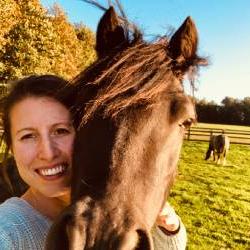Biography
Fleur qualified as a veterinary surgeon from the Royal Veterinary College (RVC), London, in 2012. She then worked in clinical roles for six years, firstly as a hospital intern in the United Arab Emirates and then in equine practices in the Cotswolds and Kent. During this time, she gained a vast amount of experience in equine veterinary medicine. Fleur joined the Epidemiology and Disease Surveillance team at the Animal Health Trust (AHT), Suffolk in 2017. Alongside a distance learning Veterinary Epidemiology and Public Health masters at the RVC, Fleur has continued to develop her epidemiological expertise. Whilst at the AHT, she was a Home Office Named Veterinary Surgeon, sitting on the charity's AWERB and it's 3Rs and Animal Care and Education (ACE) subcommittees and oversaw the health and welfare of the long-established research pony herd. Following AHT’s closure in July 2020, the Epidemiology and Disease Surveillance team were immediately retained by the UK Thoroughbred racing and breeding industry at the British Horseracing Authority (BHA). Having established Equine Infectious Disease Surveillance (EIDS) as a new initiative at the BHA, the EIDS team transferred to Cambridge Vet School in November 2021. The EIDS team work closely with industry stakeholders in the diagnosis, control and prevention of equine infectious disease. Fleur assists veterinary surgeons with a population approach to infectious disease outbreak control and advised on the equine influenza epidemic in 2019, the equine viral arteritis outbreak in the South of England in 2019 and occurrences of neurological equine herpesvirus in North Yorkshire in 2021. The EIDS team oversee a number of surveillance schemes, including the Horserace Betting Levy Board’s equine influenza scheme, monitoring equine influenza in Great Britain. The team also produce a number of surveillance reports including the quarterly equine disease surveillance report and the International Collating Centre and Fleur assists in the production of these. Fleur also collaborates with various research groups investigating equine infectious diseases.
Research
· Understanding human behavioural constraints in the implementation of equine infectious disease control and prevention measures
· Optimising methods for producing and disseminating equine infectious disease educational information to inform and advise different parties · Developing and optimising surveillance reporting platforms to assist in the rapid and successful sharing of infectious disease occurrences with global stakeholders
· Epidemiological investigation of local, national and international equine infectious disease occurrences to identify risk factors and inform and optimise future approaches to control and prevention
· Collaboration between epidemiologists and molecular scientists to further knowledge in equine pathogen epidemiology, including optimising detection methods and exploring novel vaccination
· Surveillance and monitoring of new and exotic equine infectious diseases
Publications
Whitlock, F.M. and Newton, J.R. (2021), A practitioner's guide to understanding equine infectious disease diagnostics in the United Kingdom. Part 1: How to optimise sampling approaches and a guide to agent detection testing methods. Equine Vet Educ. https://doi.org/10.1111/eve.13478 Whitlock, F.M. and Newton, J.R. (2021), A practitioner's guide to understanding infectious disease diagnostics in the United Kingdom. Part 2: Serological diagnostic testing methods and diagnostic test result interpretation. Equine Vet Educ. https://doi.org/10.1111/eve.13491 Whitlock, F.M., Newton, J.R. and Waller, A.S. (2019), Metastatic abscessation and other potential complications following strangles. Equine Vet Educ, 31: 539-542. https://doi.org/10.1111/eve.13012 Whitlock, F.M., Grewar, J. and Newton, J.R. (2021), Descriptive epidemiology of the 2019 equine influenza epidemic in Great Britain. Equine Vet J, 53: 72-72. https://doi.org/10.1111/evj.110_13495 Whitlock, F.M., Grewar, J. and Newton, J.R. (2021), Development and delivery of an interactive international reporting platform for equine influenza. Equine Vet J, 53: 73-74. https://doi.org/10.1111/evj.113_13495

